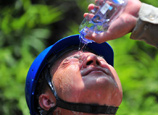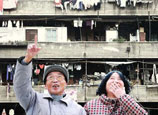
1. Implementation concept and development status quo of the “Sunshine Project”
Currently, the three major difficulties in the community-based drug rehabilitation and recovery work are the high relapse rate of drug rehabilitation and recovery personnel, low rate of rehabilitation consolidation, and difficulty in management and control. In real life, drug addicts are discriminated by the society and stayed away by family members, so they lack the care from the society and relatives. In particular, it is not easy for drug addicts to find jobs. Without the source of income, they are unable to return to the society and families. As a result, they produce a strong sense of inferiority, and lose the courage and confidence to start new life and work. Many of them give up on themselves, and fall into the the vicious circle of “drug abuse—rehabilitation—relapse—rehabilitation again.” This is the main root cause leading to high relapse rate, low rehabilitation consolidation rate, and difficulty in management and control. Therefore, solving the employment problem for drug rehabilitation and recovery personnel is the biggest difficulty among the three difficulties, and is also the premise for solving the three difficulties. Under the guidance of the above concept, taking job placement as the breakthrough point for community-based drug rehabilitation, Guizhou has built a big pattern for the development of the “Sunshine Project,” featuring leadership of party committees and governments, government support, participation of enterprises, and simultaneous implementation of multiple measures.
To build the work mechanism for the “Sunshine Project,” the provincial government specially formulated and issued the Opinions on the In-depth Development of THE “Sunshine Project” for Community-based Drug Rehabilitation and Recovery (QFBF [2011] No. 108), and made clear the guidance, objectives and tasks, guarantee system, and duties and requirements in the development of the “Sunshine Project.” Meanwhile, Guizhou Drug Control Commission formulated specific implementation opinions, made clear the responsibilities and tasks of the governments and drug control offices at all levels, as well as relevant departments including public security, health, industrial and commercial, tax, civil affairs, human society and financial authorities and the Women’s Federation, and established the joint session mechanism and coordination mechanism. To implement various work of the “Sunshine Project,” Guizhou Drug Control Commission established the leadership team to promote the “Sunshine Project,” led by Cui Yadong, chief of Guizhou Public Security Department and consisting of the leaders of financial, civil affairs, human resources, and social security departments, to uniformly organize, coordinate, and promote project construction. A leadership group led by the top head of the government was established in all cities, prefectures, and counties, and “sunshine offices” were set up in local drug control offices, and were led by directors of drug control offices, creating a construction patter of upper and lower linkage and strong promotion. Currently, the province has enrolled 3,207 special staff for community-based drug rehabilitation and recovery, and included their salaries, remuneration, and work expenditure into financial budget, providing strong organization guarantee for the development of the “Sunshine Project.”
【11】 【12】


















 China's Chongqing issues orange-coded alert of heat
China's Chongqing issues orange-coded alert of heat


![]()
